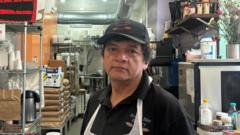The cost of coffee in the United States is on the rise as recent tariffs squeeze café and bakery owners, leading to a shift in consumer habits. With Americans shelling out approximately $100 billion annually on their favorite caffeinated beverages, experts predict this spending trend may shift due to escalating prices.
Jorge Prudencio of Bread Bite Bakery in Washington, DC, reports that his supplier of Colombian coffee has recently hiked prices following the implementation of a 10% tariff on imports, effective since April 5. The United States, being the second-largest importer of coffee globally, predominantly sources its beans from Brazil and Colombia. As costs increase, Prudencio acknowledges that he will have to raise his prices just to break even.
Kamal Mortada, manager at Au Lait café nearby, has already felt the pinch of inflation, which soared to a 40-year high during former President Biden's term. Ground coffee prices hit an all-time high in March 2025, surpassing the previous year's costs by more than a dollar. "We are seeing fewer customers for coffee," Mortada noted, as consumers now tend to opt for straightforward coffee rather than elaborate drinks.
On the West Coast, Jenny Ngo from Telescope Coffee in San Francisco faces similar challenges as she anticipates price increases from her Ethiopian and Guatemalan coffee suppliers, who are now subjected to the new tariffs. She expressed concern over rising operational costs, underscoring her inevitability to increase prices for sustainable business operation.
Prudencio remains optimistic about customer retention, hypothesizing that coffee will remain an essential purchase despite rising prices. However, he conveys shared struggles with egg prices, crucial for his bakery operations, which have skyrocketed from $42 to over $100 a case within weeks.
The rising costs of everyday goods, including coffee and eggs, have become touchstones in economic discussions, especially during political campaigns, with President Trump aiming to lower egg prices amidst escalating economic pressures. Meanwhile, small business owners like Joel Finkelstein from Qualia Coffee Roasters anticipate continued price hikes and dwindling sales as global pressures continue to mount.
As tariffs reshape the coffee landscape in America, consumers and businesses alike must navigate the complexities of rising expenses and shifting purchasing power.






















